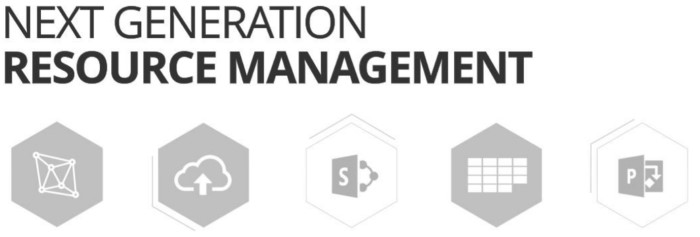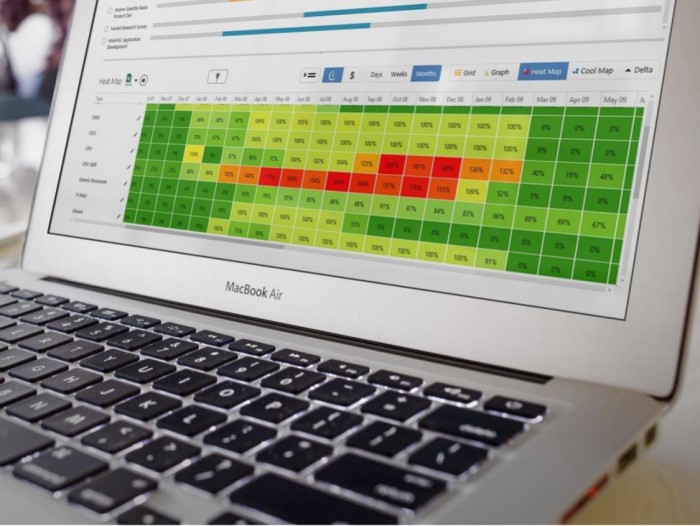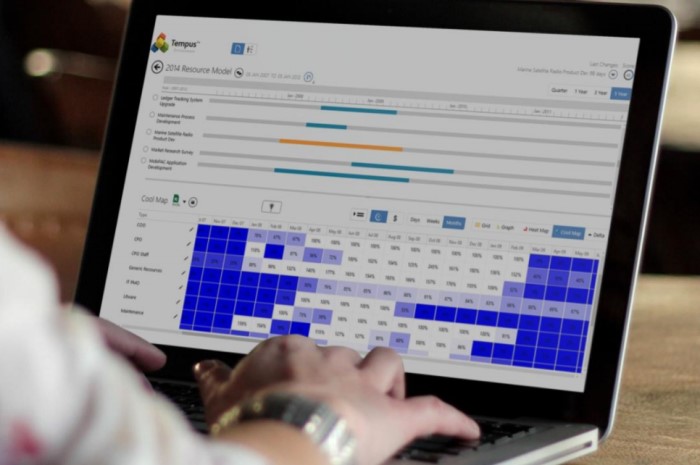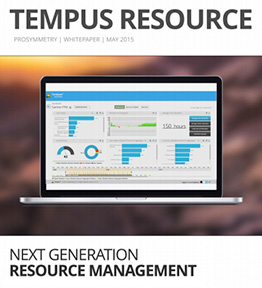
Executive Summary
“Reaching advanced organizational and Project Portfolio Management maturity requires new techniques of Resource Management. To move up, you must supercharge your resource practices with big changes and new performance.”¹
Effective Resource Management is fundamental to successfully managing a portfolio of programs and projects. In order to successfully deliver the right outcomes, stakeholders must understand how resources are currently deployed and how this deployment can be improved.
A wealth of research from Gartner, the Information Technology research and advisory firm, has pointed to a growing need for more capable Resource Management software. Existing Project and Portfolio Management (PPM) tools do not offer the ability to manage resources in the required manner. Not only do they fail to accurately communicate the ‘As-Is’ situation, but that cannot model ‘What-If’ style scenarios. The failure of the latter is particularly limiting for many forward thinking companies and organizations.
The next generation of Resource Management
World class Project and Portfolio Management requires a firm grasp on detail, and this granular attention and depth is provided by Tempus Resource from ProSymmetry, the next generation of Resource Management tools. Not only does it integrate with many popular PPM tools, but it features an innovative user interface that makes adding data simple and straightforward. This means, no matter the use case, Tempus Resource can help all organizations to optimize their Resource Management.

While existing PPM solutions are limiting when it comes to aligning company forecasts with resource allocation, Tempus Resource gives companies powerful tools to model and simulate real world scenarios. It is unique in how it supports nondestructive data driven simulations and decision making.
This Whitepaper explores the challenges of Resource Management and demonstrates how Tempus Resource offers a next generation solution for organizations seeking to improve their Resource Management capabilities.
What is Resource Management?
“What you want, as a portfolio or resource manager, is an optimized utilization of the resources you have, with ‘just-right’ commitments to get projects done and support existing applications. What you have is a tsunami of work requests to ‘get it done now’, some ‘back-of-theenvelope’ resourcing calculations and sliced-thin commitments spread out over a sea of work.”²
Time management, logistics and planning are all important parts of a project, yet it is the way resources are organized which ultimately underpins success. Resources – which can include people, equipment and facilities – are the crucial elements which make a project possible. Without adequate and appropriately selected resources, even the best laid plans can falter, deadlines can be missed, and ultimately the desired outcomes are not achieved.
Resource Management can be formally defined as:
“The process of using a company’s resources in the most efficient way possible. These resources can include tangible elements such as goods and equipment, financial resources, and labor resources such as employees. Resource Management can include ideas such as making sure one has enough physical resources for one’s business, but not an overabundance…or making sure that people are assigned to tasks that will keep them busy and not have too much downtime”³
At its core, Resource Management is about ensuring that this human, technological and physical capital is used effectively and efficiently. However, ensuring resources are used appropriately – across multiple projects, programs, and portfolios – can be a complex task.
The typical approach to Resource Management
Most organizations face major obstacles when choosing how to manage resources and thus allocate time and costs around their projects and programs. These decisions are complex enough on small projects with just a handful of resources. When managing much larger magnitudes of employees, equipment and budgets, maintaining an overview of how resources are being used can be overwhelming.
Typically, stakeholders use a variety of tools to try and address the problem – from formal Project Portfolio Management applications like Microsoft Project Server to spreadsheets like Excel and even more manual ‘pen and paper’ based approaches.
Even the most sophisticated of these PPM tools fall down when it comes to getting the required overview of Resource Management, especially as the number of projects in a portfolio scales upwards.
Conducting ‘What-If’ Analysis
In their report ‘Project Resource Capacity Planning for PM Leaders: Crawl Before You Can Walk’, Gartner are very clear that beginning a project before all the resources are available can be very detrimental to a project’s outcome:
“Insisting that projects must start ‘on time’ despite a lack of resources, can actually extend the end date of a four-month project for a year.”
A company beginning such a four-month project, with only half the resources it really needs, could encounter a whole range of issues – from insufficient preparation to the eventual overworking and burnout of the resources that are available. Clearly, even in this simple situation, alternative solutions need to be found. Scale this type of project into a program or portfolio of work, and the need to understand ‘What-If’ style scenarios becomes even greater. As companies develop their forecasts, they need a means of aligning resources to most effectively achieve these.
Tempus Resource lets stakeholders build models from which they can explore how projects and resources could otherwise be managed and deployed. The platform supports extensive ‘What-If’ analysis, simulating the outcomes of a host of different options – combining projects, splitting projects, moving start and end dates, and deploying different configurations of resources. Tempus Resource then makes it clear how overall Resource Management is affected – all before any actual decisions are made or actioned. With Tempus Resource, organizations go from a purely reactive approach to Resource Management to a much more proactive framework, seeking out the best possible solutions for their resource allocation.
The data behind the models
“PPM tools will be required to increase their emphasis beyond a traditional focus on project scheduling and task tracking to handle more dynamic forms of work, as well as a more clear-cut focus on deliverables and values.”⁴
Tempus Resource supports direct integration with many popular PPM tools, allowing project and resource data to be easily imported and detailed models quickly constructed. For organizations that have a less mature PPM practice, or do not wish to import data in this way, Tempus Resource offers a powerful means to enter data first hand.

The Tempus Resource direct date entry interface allows users to enter large amounts of information about resources and projects into the platform, either by copying and pasting from existing spreadsheets or entering the data independently. Using ‘Excel style’ controls the interface allows users to quickly and accurately enter data, use ‘Drag to fill’ to populate values, and apply filters and sorting to grids. The interface means that not having an established PPM tool or existing electronic dataset is no barrier to getting the most out of Tempus Resource.
Users can quickly build a detailed view of resources in terms of:
- Resource availability – defined by hours, cost or FTE
- Resource cost on a daily, weekly and monthly basis
- Resource education level
- Resource job type
- Resource tasks
- Resource calendars
- Resource efficiency – how many hours in a day the resource really works
The interface also allows stakeholders to populate and manage project details:
- Project speed
- Priority level
- Individual project stages
The simulations produced by Tempus Resource are a result of our realistic modeling engine. The platform’s direct data entry capabilities allow end users to quickly and easily add the level of information needed to make these models as accurate as they can be.
Sweet success – a practical illustration
Fourni are a fictional confectionery company based in Chicago, Illinois, with 400 staff. Since the arrival of their new CEO four years ago, the strategy of the firm has been to target the ‘healthy candy’ market and they have been developing a range of low fat, low sugar snacks for children.
This is a big shift away from their traditional product range, and as a consequence Fourni’s Program Management team have had to work on and coordinate a large number of projects to support the development, implementation and marketing of the new product range.
Creating new projects involves significant upfront investment, and thus the strategy is high risk for the company. Deadlines are tight and workloads are high. The company have developed conservative business forecasts, as well as more aggressive ones and want to explore how they could best use their resources to achieve both their most realistic goals, as well as best and worst case scenarios.
In the past, projects were managed from a series of Microsoft Excel spreadsheets. There was a spreadsheet for marketing, with separate tabs for specific products, there was a spreadsheet for new product development, again with separate tabs and finally there was a spreadsheet for product maintenance with similar tabs for each specific product. All of these different spreadsheets outlined the resources needed on particular projects, their deadlines and their costs. This was, unsurprisingly, a cumbersome and inefficient way of organizing the company’s portfolio. The data was disconnected and any kind of global overview of resources was next to impossible.
Given the enormity and complexity of the new company strategy, the head of PMO knew he needed to tackle Resource Management head on. The company needed a more powerful way to get an overview of resources and their activities, and Tempus Resource was the obvious solution.
Supporting best practice
Fourni’s PMO team were initially skeptical about moving away from Excel. They were concerned about shifting established project methodology, and especially data, to a new environment and tool. The team were understandably worried this could lead to a huge amount of extra work. They quickly saw that Tempus Resource was designed with their use cases in mind however.
Once they were up and running with Tempus Resource, Fourni’s PMO team were soon building powerful models and re-allocating resources in line with company projections. The platform allowed them to discover the best options for allocating resources and thus make these correspond more closely with company goals. Using the modeling features of Tempus Resource, Fourni could discover unexpected ways of using resources which could make achieving even the most optimistic forecasts a possibility.
Adding resource data was straightforward. The team were at home with the direct entry interface, and as ‘Excel power users’, they quickly got to grips with the various shortcuts and user interface elements. Project Managers rapidly built profiles of individual resources – their identity, skills, salary, tasks, educational level and working hours.
The Tempus Resource interface allowed Fourni to separate the catalog of individual resources from projects and allowed the team to move employees between projects easily. For example, the decision was made to reduce the number of resources in the manufacturing of the company’s older candy and move them to work on some of the new projects in the ‘healthy candy’ range. Using the ‘bulk resource allocation’ tool, the team could rapidly select resources and move them to different projects where they were most needed. This was far quicker and more visual than cutting and pasting resources between Excel spreadsheets as the company would have had to do otherwise.
With the newly established dataset of resources and projects in place, Fourni were now set to begin modeling their projects, and understanding where and how they could make improvements.
‘What-If’ Analysis
With data entry done, the Fourni PMO team were able to begin testing models based on the information held in the platform. The first task was to add projects and resources to a particular model. Fourni were interested in seeing how they could optimize their product distribution capabilities. They took the following steps to achieve this:
- They added all their product distribution projects to a model – including legacy projects with products they were planning on ‘winding down’ as well as their new projects.
- The model showed how resources were used over the different individual projects. It was possible to see that some resources were being overused – they were allocated to work on both old and new projects.
- The model also showed that many of the new projects were starting and ending at the same time.
- The team decided on a number of hypotheses to test.
- They wanted to know what would happen if they moved half of their resources from old projects to new ones, to see how this would affect product distribution targets.
- They also wanted to understand what would happen to resource allocation if they brought forward the distribution deadlines of older projects.
- Seeing as many of the new projects had the same deadlines, but different priorities, they wanted to test what would happen if they paused some of the less pressing projects and split others.
Testing these different hypotheses was incredibly easy using Tempus Resource, and with the recommendation tool, it was even easier to decide what would be the best way to distribute resources.
Next generation Resource Management
The case of Fourni illustrates just how useful Tempus Resource can be. Because the tool separates individual resources from projects and allows companies to assign specific attributes to them, it is possible to move them to where they are most needed.
As a means of gathering a global overview of a company’s program portfolio, Tempus Resource is second to none.
At the same time it also allowed the kind of fine detailed resource definition which the company needed to get the most accurate insight into its resources by adding information with the direct data entry interface. As a consequence, Fourni could build models and make intelligent, data driven decisions.
Real world example
Tempus Resource is currently helping many real world companies to maximize their Resource Management efforts. These include Silverchair.
Based in Charlottesville, VA, Silverchair’s mission is to be the most creative, dynamic, and sought-after product development partner to the STM knowledge community. Zikki Munyao, Director of the PMO for Silverchair, explains how Tempus Resource has transformed their operations:
“Within Tempus, we will be able to see our entire portfolio easily, with start and end dates clearly visible in the model listing. That’s helpful, because that’s information we can’t see in a single view in Project Server. We can also load multiple projects into Tempus and perform our estimations there to validate the accuracy of information going out to clients. That’s extremely important for our processes and for our contract documentation. We have to know that when we value our estimates we’re not just relying on Excel formulas.
With Tempus, we can validate estimates taking into account factors like the priority level of the project, the resources involved and how resource allocation to that particular project might affect others. We can do this in Tempus before the data is entered into Project Server, so that we know that the contract documentation going out to the client is accurate and realistic.”
The direct data entry features set
“Reaching advanced organizational and Project Portfolio Management maturity requires new techniques of Resource Management. To move up, you must supercharge your resource practices with big changes and new performance.”⁵
For many organizations with established PPM tools, Tempus Resource can automatically connect and import project and resource data. But as this Whitepaper has demonstrated, Tempus Resource also supports a more direct means of data entry, allowing those with less mature tools or datasets to get up and running quickly and easily.
The direct entry interface offers a dynamic and intuitive means for entering large quantities of information about resources and projects, while the UI functions in a similar way to tools like Microsoft Excel.
Core direct entry interface features include:
Central resource catalog
All of the interface’s features are supported by an enterprise-class resource catalogue. All resources loaded into this centralized repository are accessible across all projects. This enables a holistic view of resource capacity, availability and allocation.
Dynamic grids
Dynamic direct data entry supports drag and drop, click and drag, and copy and paste. These Excel like features make data entry quick, easy and accurate.
Integrated search and intelligent filtering
Allows end users to rapidly find resources and tasks from hundreds or thousands of possible items.
Bulk update
Add multiple resources in a single operation, eliminating the complexities of initial data entry.
Inline editing
Quickly update resource data in place on screen.
Making data entry simple
Getting project and resource data into Tempus Resource is, logically, one of the principal tasks when using the tool for the first time. Integration with many popular PPM tools is one option, but the direct entry interface takes the pain out of more traditional ‘manual’ data entry. Not only does it make the process simple by adopting many of the UI standards from tools like Excel, but it also ensures data accuracy. This is key to maximizing the benefits of the tool’s modeling and simulation functionality, and the first step to next generation Resource Management.
More information
For more information about Tempus Resource from ProSymmetry please contact:
Phone: 877-880-8788
Fax: 866-495-1734
Email: info@prosymmetry.com
Web: www.prosymmetry.com/
Twitter: @ProSymmetry
To download the “Next Generation Resource Management” whitepaper, simply click the button below.
Bibliography
¹Gartner – Supercharge Your Resource Management to Support Advanced Organizational and PPM Maturity, September 2014
²Ibid
³http://www.businessdictionary.com/definition/resource-management.html
⁴Gartner – Predicts 2015: PPM Leaders Must Innovate, Collaborate and Reinvent Themselves, November 2014 2015
⁵Gartner – Supercharge Your Resource Management to Support Advanced Organizational and PPM Maturity, September 2014
To download the “Next Generation Resource Management” whitepaper, simply click the button below.
